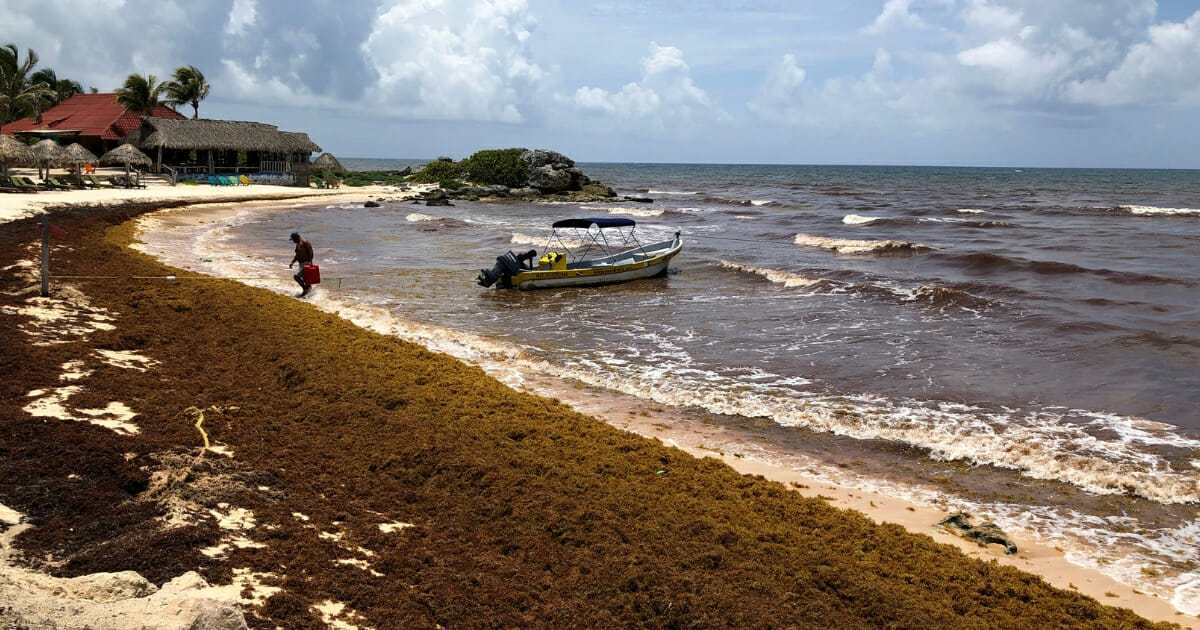
Mexico's Tourism Industry Takes Major Hit as Picturesque Beaches Turn into Muddy, Stinking Hellscapes
If you want to go to the beach during the summer, it’s not unusual for you to have to deal with seaweed washing up onshore.
What is unusual is for giant mounds of the stuff to wash up, making it almost impossible to enjoy a day at the beach.
That’s what’s happening in Mexico, where some of the country’s most picturesque shores are located.
And it stinks.
According to The Associated Press, it’s the result of a species of seaweed known as sargassum.
“The floating mats of algae seldom reached the famed beaches around Cancun until 2011, but they’re now severely affecting tourism, with visitors often facing stinking mounds of rotting seaweed at the waterline,” the AP reported Friday.
“Initial reports suggested the seaweed came from an area of the Atlantic off the northern coast of Brazil, near the mouth of the Amazon River. Increased nutrient flows from deforestation or fertilizer runoff could be feeding the algae bloom.”
However, one oceanographer says that we “should not blame the Brazilians.”
Donald R. Johnson, a senior researcher at the University of Southern Mississippi Gulf Coast Research Laboratory, says nutrient flows from the Congo River, dust blowing across the ocean from Africa and “[i]ncreased upwelling of nutrient-laden deeper ocean water in the tropical Atlantic” are all playing a role.
“While it sometimes appears sargassum mats float west into the Caribbean, experts say the seaweed actually appears to be sloshing back and forth between the Caribbean and Africa,” the AP reported.
The problem has hit Mexico’s prime tourist areas the worst, which is an issue.
And while the government has spent $17 million on cleanup, it’s clear that there won’t be a solution to the problem in the near future.
Giant sargassum formation approaches Mexican beaches https://t.co/uq8PgErxnU
— Ricardo Alvarado (@ricky_alvarado_) June 25, 2019
Mexico’s president, Andrés Manuel López Obrador, made things worse when he visited the area and basically said the problem wasn’t really that big of an issue.
“I haven’t talked much about this, because I don’t see it as a very serious issue, as some claim it is,” López Obrador said.
“No, no, we’re going to solve it,” he said.
López Obrador added that he wouldn’t be subcontracting out the cleanup but would instead use the Mexican Navy to build boats that could collect the seaweed before it washes ashore.
That isn’t likely to make people like Ricardo de Valle happy.
De Valle owns a business in the resort town of Playa del Carmen.
“We offer sun and sand, nothing else,” he said.
“That is what we’re selling. And right now we’re fooling our tourists.”
“Fighting sargassum is a chore every day,” Cancún Mayor Mara Lezama said.
“You clean the beaches in the morning, and sometimes you clean them again in the afternoon or at night, and then you have to go back and clean it again,” Lezama added.
The problem hit the wider Caribbean last year; while the seaweed had previously washed up on their shores in 2011, scientists had hoped it was a one-time thing.
“In 2011 it was the first time we’d seen it,” professor Hazel Oxenford of the University of the West Indies told the BBC.
“It came as a complete shock and no one had a clue what to do with it.”
“On satellite images the quantity that’s being picked up is greater than ever before,” Oxenford said. “Certainly we’ve had it for longer and in huge amounts. And some of the islands are getting it for the first time.”
“We are seeing a major impact on our countries, economically, socially,” June Soomer, general secretary of the Association of Caribbean States, told the AP.
According to Soomer, sargassum pileups on beaches “are now considered national emergencies” in several Caribbean countries.
Right now, efforts at a solution only seem to amount to triage.
The $17 million the government has spent has removed a half a million tons of the rotting stuff from the beaches doesn’t seem to have done much except reduce the scope of the problem.
Considering these beaches in a part of the world where sun, sand and surf are the primary industries, that’s a major issue — and it’s one that could get worse.
Truth and Accuracy
We are committed to truth and accuracy in all of our journalism. Read our editorial standards.
Advertise with The Western Journal and reach millions of highly engaged readers, while supporting our work. Advertise Today.












